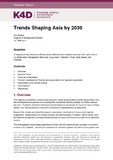| dc.contributor.author | Kasper, Eric | |
| dc.coverage.spatial | Afghanistan | en |
| dc.coverage.spatial | Bangladesh | en |
| dc.coverage.spatial | Myanmar | en |
| dc.coverage.spatial | Kyrgyzstan | en |
| dc.coverage.spatial | Tajikistan | en |
| dc.coverage.spatial | China | en |
| dc.coverage.spatial | India | en |
| dc.date.accessioned | 2017-10-13T11:33:38Z | |
| dc.date.available | 2017-10-13T11:33:38Z | |
| dc.date.issued | 2017-04-12 | |
| dc.identifier.citation | Kasper, E. (2017). A mapping of key literature outlining trends affecting Asia between now and 2030, with a focus on Afghanistan, Bangladesh, Myanmar, Kyrgyzstan, Tajikistan, China, India, Nepal, and Pakistan. K4D Helpdesk Report. Brighton, UK: Institute of Development Studies. | en |
| dc.identifier.uri | https://opendocs.ids.ac.uk/opendocs/handle/20.500.12413/13280 | |
| dc.description.abstract | The majority of published material speculating on trends shaping Asia by 2030 comes either from the development perspective or the perspective of national security (usually the USA’s national security). Therefore, traditional developmental and security issues are the focus of many of these pieces: from demographics to economic productivity to assessments of geopolitics. Beyond this, trends were identified around urbanisation, development finance and regional cooperation, sustainability and climate change, and technological innovation. Some trends, such as those around gender, emerged across sources but were not the primary topic of any particular source. | en |
| dc.language.iso | en | en |
| dc.publisher | Institute of Development Studies | en |
| dc.relation.ispartofseries | K4D Helpdesk Report; | |
| dc.rights.uri | https://www.nationalarchives.gov.uk/doc/open-government-licence/version/3/ | en |
| dc.subject | Aid | en |
| dc.title | Trends Shaping Asia by 2030 | en |
| dc.type | Helpdesk | en |
| dc.rights.holder | DFID | en |
| dcterms.dateAccepted | 2017-04-12 | |
| rioxxterms.funder | Default funder | en |
| rioxxterms.identifier.project | K4D | en |
| rioxxterms.version | NA | en |
| rioxxterms.funder.project | 0986883a-6d0f-4bb8-9c46-5e0682934d65 | en |

